Brian Dickson: A Judge's Journey
Professor Kent Roach and Justice Robert J. Sharpe
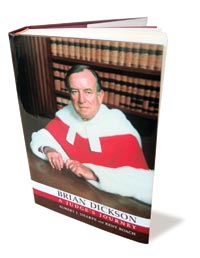 From the publisher: When Brian Dickson was appointed in 1973, the Supreme Court of Canada was preoccupied with run-of-themill disputes. By the time he retired as Chief Justice of Canada in 1990, the Court had become a major national institution, very much in the public eye. The Court's decisions, reforming large areas of private and public law under the Charter of Rights, were the subject of intense public interest and concern. Brian Dickson played a leading role in this transformation. Engaging and incisive, Brian Dickson: A Judge's Journey traces Dickson's life from a Depression-era boyhood in Saskatchewan, to the battlefields of Normandy, the boardrooms of corporate Canada and high judicial office, and provides an inside look at the work of the Supreme Court during its most crucial period. Dickson's journey was an important part of the evolution of the Canadian judiciary and of Canada itself. Sharpe and Roach have written an accessible biography of one of Canada's greatest legal figures that provides new insights into the work of Canada's highest court.
From the publisher: When Brian Dickson was appointed in 1973, the Supreme Court of Canada was preoccupied with run-of-themill disputes. By the time he retired as Chief Justice of Canada in 1990, the Court had become a major national institution, very much in the public eye. The Court's decisions, reforming large areas of private and public law under the Charter of Rights, were the subject of intense public interest and concern. Brian Dickson played a leading role in this transformation. Engaging and incisive, Brian Dickson: A Judge's Journey traces Dickson's life from a Depression-era boyhood in Saskatchewan, to the battlefields of Normandy, the boardrooms of corporate Canada and high judicial office, and provides an inside look at the work of the Supreme Court during its most crucial period. Dickson's journey was an important part of the evolution of the Canadian judiciary and of Canada itself. Sharpe and Roach have written an accessible biography of one of Canada's greatest legal figures that provides new insights into the work of Canada's highest court.
Selected for the John Wesley Dafoe Book Prize for 2003, the Dafoe Foundation praised the book as "an illuminating account of the responsibilities and workings of the Supreme Court, and a clear explanation of the legal issues and public significance of the cases." The Dafoe Prize is awarded annually to the book that provides the best contribution to our understanding of Canada.
Back to Top
The Unity of Public Law
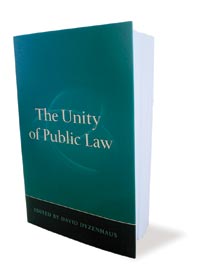 The Unity of Public Law is a collection of papers from an international conference of public lawyers held at the Law Faculty in 2003. The themes from the conference grew out of one of the most significant judgments from the Supreme Court in public law in recent years, Baker v. Canada. The decision of the majority, given by Justice Claire L'Heureux-Dubé, raises very important issues in constitutional law, administrative law and public international law, and suggests that there is a unity between these areas of law; hence the title of the book. A book launch was held in London in March, at Matrix Chambers, the leading group of human rights lawyers in the United Kingdom.
The Unity of Public Law is a collection of papers from an international conference of public lawyers held at the Law Faculty in 2003. The themes from the conference grew out of one of the most significant judgments from the Supreme Court in public law in recent years, Baker v. Canada. The decision of the majority, given by Justice Claire L'Heureux-Dubé, raises very important issues in constitutional law, administrative law and public international law, and suggests that there is a unity between these areas of law; hence the title of the book. A book launch was held in London in March, at Matrix Chambers, the leading group of human rights lawyers in the United Kingdom.
Back to Top
Justice in the Balkans: Prosecuting War Crimes in the Hague Tribunal
Professor John Hagan
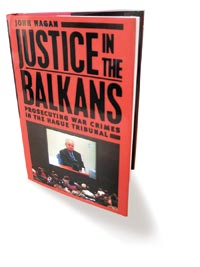 From the publisher: Called a fig leaf for inaction by many at its inception, the International Criminal Tribunal for the Former Yugoslavia has grown from an unfunded U.N. Security Council resolution to an institution with more than 1,000 employees and a $100 million annual budget. With Slobodan Milosevic now on trial and more than forty fellow indictees currently detained, the success of the Hague tribunal has caught many of its former critics by surprise. Justice in the Balkans presents a firsthand look at the inner workings of the tribunal as it has moved from an initial period of irrelevance to the first truly effective international court since Nuremberg. Creating an institution that transcends national borders is a challenge fraught with political and organizational difficulties, yet the Hague tribunal has increasingly met these difficulties head-on and overcome them. The chief reason for its success, argues John Hagan, is the people who have shaped it, particularly its charismatic chief prosecutor, Louise Arbour. With drama and immediacy, Justice in the Balkans re-creates how Arbour worked with others to turn the tribunal's fortunes around.
From the publisher: Called a fig leaf for inaction by many at its inception, the International Criminal Tribunal for the Former Yugoslavia has grown from an unfunded U.N. Security Council resolution to an institution with more than 1,000 employees and a $100 million annual budget. With Slobodan Milosevic now on trial and more than forty fellow indictees currently detained, the success of the Hague tribunal has caught many of its former critics by surprise. Justice in the Balkans presents a firsthand look at the inner workings of the tribunal as it has moved from an initial period of irrelevance to the first truly effective international court since Nuremberg. Creating an institution that transcends national borders is a challenge fraught with political and organizational difficulties, yet the Hague tribunal has increasingly met these difficulties head-on and overcome them. The chief reason for its success, argues John Hagan, is the people who have shaped it, particularly its charismatic chief prosecutor, Louise Arbour. With drama and immediacy, Justice in the Balkans re-creates how Arbour worked with others to turn the tribunal's fortunes around.
Back to Top
Gender and Human Rights: The Collected Courses of the Academy of European Law
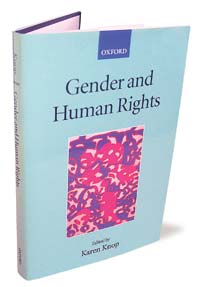 From the publisher: The field of women's international human rights law depends in every aspect on some combination of ideas about feminism, rights, and international society. Yet these ideas and the relationships between them have been examined and questioned much more outside than inside the field. By bringing a variety of vantage points and methodologies from other disciplines and areas of law to bear on gender and human rights, this collection demonstrates the theoretical and practical importance of revisiting the basic concepts, how they work, and how they interact. The collection offers gender perspectives on the fundamentals of women's international human rights from disciplines as diverse as notions of citizenship, queer theory, philosophies of rights, post-colonialism, and migration studies, and from such areas of law as constitutional and humanitarian law.
From the publisher: The field of women's international human rights law depends in every aspect on some combination of ideas about feminism, rights, and international society. Yet these ideas and the relationships between them have been examined and questioned much more outside than inside the field. By bringing a variety of vantage points and methodologies from other disciplines and areas of law to bear on gender and human rights, this collection demonstrates the theoretical and practical importance of revisiting the basic concepts, how they work, and how they interact. The collection offers gender perspectives on the fundamentals of women's international human rights from disciplines as diverse as notions of citizenship, queer theory, philosophies of rights, post-colonialism, and migration studies, and from such areas of law as constitutional and humanitarian law.
Back to Top
It's Time: Research Studies Prepared for the Wise Persons' Committee to Review the Structure of Securities Regulation in Canada
Professor Doug Harris (Editor)
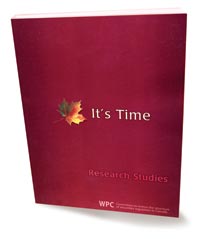 In December 2003, the Wise Persons' Committee to Review the Structure of Securities Regulation in Canada released its report. Titled It's Time, the Committee's report recommended that Canada create a single national securities regulator. Doug Harris served as the Research Director for the Committee, designing and implementing a research program that produced ten major research studies and three constitutional opinions. The research studies and constitutional opinions are published in this 570-page companion volume to the Committee's report, and represent comprehensive and rigorous new work on Canadian and international capital markets by respected independent academics, consulting firms and lawyers from Canada, the United States, Australia and the European Union.
In December 2003, the Wise Persons' Committee to Review the Structure of Securities Regulation in Canada released its report. Titled It's Time, the Committee's report recommended that Canada create a single national securities regulator. Doug Harris served as the Research Director for the Committee, designing and implementing a research program that produced ten major research studies and three constitutional opinions. The research studies and constitutional opinions are published in this 570-page companion volume to the Committee's report, and represent comprehensive and rigorous new work on Canadian and international capital markets by respected independent academics, consulting firms and lawyers from Canada, the United States, Australia and the European Union.
Back to Top
The Ultimate Rule of Law
Professor David Beatty
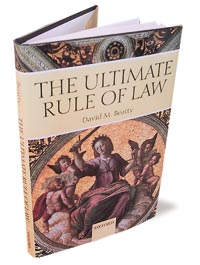 From the publisher: The Ultimate Rule of Law addresses the age-old tension between law and politics by examining whether the personal beliefs of judges come into play in adjudicating on issues of religious freedom, sex discrimination, and social and economic rights. Beatty evaluates and compares decisions made by the Supreme Courts of various countries on controversial issues such as government funding of religious schools, abortion, same-sex marriages, women in the military, and rights to basic shelter and live-saving medical treatment. Beatty develops a radical alternative to the conventional view that in deciding these cases judges engage in an essentially interpretative, and thus subjective act, relying ultimately on their personal beliefs and political opinions. His analysis shows that it is possible to apply an impartial and objective method of judicial review, based on the principle of proportionality, which acts as an ultimate rule of law and is fully compatible with the ideals of democracy and popular sovereignty.
From the publisher: The Ultimate Rule of Law addresses the age-old tension between law and politics by examining whether the personal beliefs of judges come into play in adjudicating on issues of religious freedom, sex discrimination, and social and economic rights. Beatty evaluates and compares decisions made by the Supreme Courts of various countries on controversial issues such as government funding of religious schools, abortion, same-sex marriages, women in the military, and rights to basic shelter and live-saving medical treatment. Beatty develops a radical alternative to the conventional view that in deciding these cases judges engage in an essentially interpretative, and thus subjective act, relying ultimately on their personal beliefs and political opinions. His analysis shows that it is possible to apply an impartial and objective method of judicial review, based on the principle of proportionality, which acts as an ultimate rule of law and is fully compatible with the ideals of democracy and popular sovereignty.
Back to Top
Towards Juristocracy: The Origins and Consequences of the New Constitutionalism
Professor Ran Hirschl (cross-appointed to the Faculty of Law)
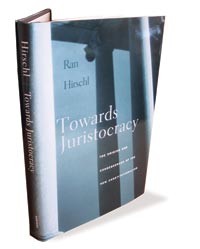 Towards Juristocracy draws upon a comprehensive comparative inquiry into the political origins and consequences of the recent constitutional revolutions in Canada, Israel, New Zealand, and South Africa, to challenge the conventional wisdom that the constitutionalization of rights and the establishment of judicial review have benevolent and progressive origins, and significant redistributive, power-diffusing consequences.
Towards Juristocracy draws upon a comprehensive comparative inquiry into the political origins and consequences of the recent constitutional revolutions in Canada, Israel, New Zealand, and South Africa, to challenge the conventional wisdom that the constitutionalization of rights and the establishment of judicial review have benevolent and progressive origins, and significant redistributive, power-diffusing consequences.
"The great bulk of scholarship on judicial review suffers two major shortcomings: it lacks any serious attention to what goes on outside the United States, and, even within the American context, it has been marred by the work of a generation of scholars who came of age during the highly unusual era of the Warren Court. Hirschl's superb treatment remedies both these defects, with results that should be profoundly troubling to all partisans of independent courts and judicial review. It should be mandatory reading for constitutional and democratic theorists the world over, as well as anyone who has a hand in institutional design of new democracies."
- Ian Shapiro, Yale University
Back to Top

 From the publisher: When Brian Dickson was appointed in 1973, the Supreme Court of Canada was preoccupied with run-of-themill disputes. By the time he retired as Chief Justice of Canada in 1990, the Court had become a major national institution, very much in the public eye. The Court's decisions, reforming large areas of private and public law under the Charter of Rights, were the subject of intense public interest and concern. Brian Dickson played a leading role in this transformation. Engaging and incisive, Brian Dickson: A Judge's Journey traces Dickson's life from a Depression-era boyhood in Saskatchewan, to the battlefields of Normandy, the boardrooms of corporate Canada and high judicial office, and provides an inside look at the work of the Supreme Court during its most crucial period. Dickson's journey was an important part of the evolution of the Canadian judiciary and of Canada itself. Sharpe and Roach have written an accessible biography of one of Canada's greatest legal figures that provides new insights into the work of Canada's highest court.
From the publisher: When Brian Dickson was appointed in 1973, the Supreme Court of Canada was preoccupied with run-of-themill disputes. By the time he retired as Chief Justice of Canada in 1990, the Court had become a major national institution, very much in the public eye. The Court's decisions, reforming large areas of private and public law under the Charter of Rights, were the subject of intense public interest and concern. Brian Dickson played a leading role in this transformation. Engaging and incisive, Brian Dickson: A Judge's Journey traces Dickson's life from a Depression-era boyhood in Saskatchewan, to the battlefields of Normandy, the boardrooms of corporate Canada and high judicial office, and provides an inside look at the work of the Supreme Court during its most crucial period. Dickson's journey was an important part of the evolution of the Canadian judiciary and of Canada itself. Sharpe and Roach have written an accessible biography of one of Canada's greatest legal figures that provides new insights into the work of Canada's highest court. The Unity of Public Law is a collection of papers from an international conference of public lawyers held at the Law Faculty in 2003. The themes from the conference grew out of one of the most significant judgments from the Supreme Court in public law in recent years, Baker v. Canada. The decision of the majority, given by Justice Claire L'Heureux-Dubé, raises very important issues in constitutional law, administrative law and public international law, and suggests that there is a unity between these areas of law; hence the title of the book. A book launch was held in London in March, at Matrix Chambers, the leading group of human rights lawyers in the United Kingdom.
The Unity of Public Law is a collection of papers from an international conference of public lawyers held at the Law Faculty in 2003. The themes from the conference grew out of one of the most significant judgments from the Supreme Court in public law in recent years, Baker v. Canada. The decision of the majority, given by Justice Claire L'Heureux-Dubé, raises very important issues in constitutional law, administrative law and public international law, and suggests that there is a unity between these areas of law; hence the title of the book. A book launch was held in London in March, at Matrix Chambers, the leading group of human rights lawyers in the United Kingdom. From the publisher: Called a fig leaf for inaction by many at its inception, the International Criminal Tribunal for the Former Yugoslavia has grown from an unfunded U.N. Security Council resolution to an institution with more than 1,000 employees and a $100 million annual budget. With Slobodan Milosevic now on trial and more than forty fellow indictees currently detained, the success of the Hague tribunal has caught many of its former critics by surprise. Justice in the Balkans presents a firsthand look at the inner workings of the tribunal as it has moved from an initial period of irrelevance to the first truly effective international court since Nuremberg. Creating an institution that transcends national borders is a challenge fraught with political and organizational difficulties, yet the Hague tribunal has increasingly met these difficulties head-on and overcome them. The chief reason for its success, argues John Hagan, is the people who have shaped it, particularly its charismatic chief prosecutor, Louise Arbour. With drama and immediacy, Justice in the Balkans re-creates how Arbour worked with others to turn the tribunal's fortunes around.
From the publisher: Called a fig leaf for inaction by many at its inception, the International Criminal Tribunal for the Former Yugoslavia has grown from an unfunded U.N. Security Council resolution to an institution with more than 1,000 employees and a $100 million annual budget. With Slobodan Milosevic now on trial and more than forty fellow indictees currently detained, the success of the Hague tribunal has caught many of its former critics by surprise. Justice in the Balkans presents a firsthand look at the inner workings of the tribunal as it has moved from an initial period of irrelevance to the first truly effective international court since Nuremberg. Creating an institution that transcends national borders is a challenge fraught with political and organizational difficulties, yet the Hague tribunal has increasingly met these difficulties head-on and overcome them. The chief reason for its success, argues John Hagan, is the people who have shaped it, particularly its charismatic chief prosecutor, Louise Arbour. With drama and immediacy, Justice in the Balkans re-creates how Arbour worked with others to turn the tribunal's fortunes around. From the publisher: The field of women's international human rights law depends in every aspect on some combination of ideas about feminism, rights, and international society. Yet these ideas and the relationships between them have been examined and questioned much more outside than inside the field. By bringing a variety of vantage points and methodologies from other disciplines and areas of law to bear on gender and human rights, this collection demonstrates the theoretical and practical importance of revisiting the basic concepts, how they work, and how they interact. The collection offers gender perspectives on the fundamentals of women's international human rights from disciplines as diverse as notions of citizenship, queer theory, philosophies of rights, post-colonialism, and migration studies, and from such areas of law as constitutional and humanitarian law.
From the publisher: The field of women's international human rights law depends in every aspect on some combination of ideas about feminism, rights, and international society. Yet these ideas and the relationships between them have been examined and questioned much more outside than inside the field. By bringing a variety of vantage points and methodologies from other disciplines and areas of law to bear on gender and human rights, this collection demonstrates the theoretical and practical importance of revisiting the basic concepts, how they work, and how they interact. The collection offers gender perspectives on the fundamentals of women's international human rights from disciplines as diverse as notions of citizenship, queer theory, philosophies of rights, post-colonialism, and migration studies, and from such areas of law as constitutional and humanitarian law. In December 2003, the Wise Persons' Committee to Review the Structure of Securities Regulation in Canada released its report. Titled It's Time, the Committee's report recommended that Canada create a single national securities regulator. Doug Harris served as the Research Director for the Committee, designing and implementing a research program that produced ten major research studies and three constitutional opinions. The research studies and constitutional opinions are published in this 570-page companion volume to the Committee's report, and represent comprehensive and rigorous new work on Canadian and international capital markets by respected independent academics, consulting firms and lawyers from Canada, the United States, Australia and the European Union.
In December 2003, the Wise Persons' Committee to Review the Structure of Securities Regulation in Canada released its report. Titled It's Time, the Committee's report recommended that Canada create a single national securities regulator. Doug Harris served as the Research Director for the Committee, designing and implementing a research program that produced ten major research studies and three constitutional opinions. The research studies and constitutional opinions are published in this 570-page companion volume to the Committee's report, and represent comprehensive and rigorous new work on Canadian and international capital markets by respected independent academics, consulting firms and lawyers from Canada, the United States, Australia and the European Union. From the publisher: The Ultimate Rule of Law addresses the age-old tension between law and politics by examining whether the personal beliefs of judges come into play in adjudicating on issues of religious freedom, sex discrimination, and social and economic rights. Beatty evaluates and compares decisions made by the Supreme Courts of various countries on controversial issues such as government funding of religious schools, abortion, same-sex marriages, women in the military, and rights to basic shelter and live-saving medical treatment. Beatty develops a radical alternative to the conventional view that in deciding these cases judges engage in an essentially interpretative, and thus subjective act, relying ultimately on their personal beliefs and political opinions. His analysis shows that it is possible to apply an impartial and objective method of judicial review, based on the principle of proportionality, which acts as an ultimate rule of law and is fully compatible with the ideals of democracy and popular sovereignty.
From the publisher: The Ultimate Rule of Law addresses the age-old tension between law and politics by examining whether the personal beliefs of judges come into play in adjudicating on issues of religious freedom, sex discrimination, and social and economic rights. Beatty evaluates and compares decisions made by the Supreme Courts of various countries on controversial issues such as government funding of religious schools, abortion, same-sex marriages, women in the military, and rights to basic shelter and live-saving medical treatment. Beatty develops a radical alternative to the conventional view that in deciding these cases judges engage in an essentially interpretative, and thus subjective act, relying ultimately on their personal beliefs and political opinions. His analysis shows that it is possible to apply an impartial and objective method of judicial review, based on the principle of proportionality, which acts as an ultimate rule of law and is fully compatible with the ideals of democracy and popular sovereignty. Towards Juristocracy draws upon a comprehensive comparative inquiry into the political origins and consequences of the recent constitutional revolutions in Canada, Israel, New Zealand, and South Africa, to challenge the conventional wisdom that the constitutionalization of rights and the establishment of judicial review have benevolent and progressive origins, and significant redistributive, power-diffusing consequences.
Towards Juristocracy draws upon a comprehensive comparative inquiry into the political origins and consequences of the recent constitutional revolutions in Canada, Israel, New Zealand, and South Africa, to challenge the conventional wisdom that the constitutionalization of rights and the establishment of judicial review have benevolent and progressive origins, and significant redistributive, power-diffusing consequences.